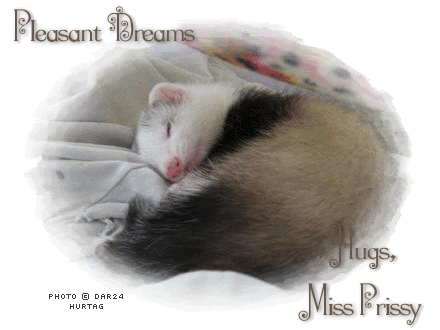Post by smokeyoshi on Jan 3, 2015 18:07:45 GMT -5
Based on a discussion I read on another board, for the past year or so I have been recommending avoiding ferret and cat foods containing green peas. This was due to the perceived relationship between the amount of cysteine (an amino acid) in peas and the formation of cysteine stones in the kidneys, bladder and urinary tract. Two popular kibbles containing peas are Evo and ZuPreem Grain Free. In the discussion, a person stated that legumes, including peas and beans, contained high amount of cysteine. It turns out that this information was not entirely accurate.
The subject came up on yet another forum so I decided to do some research on kidney and bladder stones. This is the first of about about 6 articles I read www.smallanimalchannel.com/ferrets/ferret-health/bladder-stones.aspx
I discovered that cysteine stones are the least common of the 4 types of stones, and that they are caused by a genetic defect which prevents the kidneys from reabsorbing cysteine. In this case, it is best to avoid foods that contain moderate to high amounts of cysteine. "Cysteine is found naturally in a number of foods, including egg yolks, red peppers, garlic, onions, yogurt, grains such as wheat germ and oats, poultry and dark leafy vegetables like Brussels sprouts and broccoli." Again, cysteine stones are caused by a genetic defect. www.livestrong.com/article/256383-what-is-cysteine/
Calcium stones are by far the most common, usually in the form of calcium oxalate. Oxalate is found in many foods, and diet may be one contributing factor to the formation of this type of stone, but fresh peas have a very low oxalate content and canned peas a moderate amount. These amounts are based on human serving sizes of 1/2 cup. www.ohf.org/docs/OxalateContent092003.pdf
Struvite stones are usually the result of infection, and uric acid stones are formed from uric acid, a by-product of protein metabolism. These can actually result from a diet too high in protein, for humans, that is. But in humans, uric acid stones are only about 1-3% of the total.
An internet search of "peas cause kidney stones" did not show any articles on the specific topic, but "chick peas kidney stones" returned several articles stating that garbanzos are high in oxalate and persons predisposed to stones should "avoid over-consumption.".
Based on this research, I'm no longer going to recommend against any kibbles solely because they contain peas, but on more traditional guidelines like meat protein, amount of meat products vs vegetable and starches, etc. And NO CORN, as corn starch breaks down into sugars which can cause insulinoma. Obviously, as carnivores, ferrets should eat more meat and less if any vegetables. In any case, I encourage you to do your own research as well, so that you are comfortable knowing you are doing the best you can by your pets.
The subject came up on yet another forum so I decided to do some research on kidney and bladder stones. This is the first of about about 6 articles I read www.smallanimalchannel.com/ferrets/ferret-health/bladder-stones.aspx
I discovered that cysteine stones are the least common of the 4 types of stones, and that they are caused by a genetic defect which prevents the kidneys from reabsorbing cysteine. In this case, it is best to avoid foods that contain moderate to high amounts of cysteine. "Cysteine is found naturally in a number of foods, including egg yolks, red peppers, garlic, onions, yogurt, grains such as wheat germ and oats, poultry and dark leafy vegetables like Brussels sprouts and broccoli." Again, cysteine stones are caused by a genetic defect. www.livestrong.com/article/256383-what-is-cysteine/
Calcium stones are by far the most common, usually in the form of calcium oxalate. Oxalate is found in many foods, and diet may be one contributing factor to the formation of this type of stone, but fresh peas have a very low oxalate content and canned peas a moderate amount. These amounts are based on human serving sizes of 1/2 cup. www.ohf.org/docs/OxalateContent092003.pdf
Struvite stones are usually the result of infection, and uric acid stones are formed from uric acid, a by-product of protein metabolism. These can actually result from a diet too high in protein, for humans, that is. But in humans, uric acid stones are only about 1-3% of the total.
An internet search of "peas cause kidney stones" did not show any articles on the specific topic, but "chick peas kidney stones" returned several articles stating that garbanzos are high in oxalate and persons predisposed to stones should "avoid over-consumption.".
Based on this research, I'm no longer going to recommend against any kibbles solely because they contain peas, but on more traditional guidelines like meat protein, amount of meat products vs vegetable and starches, etc. And NO CORN, as corn starch breaks down into sugars which can cause insulinoma. Obviously, as carnivores, ferrets should eat more meat and less if any vegetables. In any case, I encourage you to do your own research as well, so that you are comfortable knowing you are doing the best you can by your pets.





